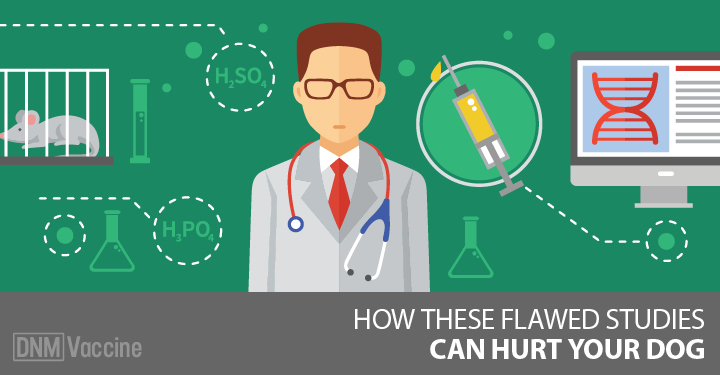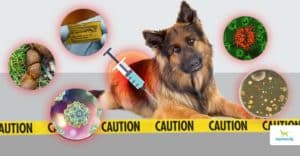Dog owners are finally starting to question the safety of vaccines … and I applaud you for doing this!
More and more vets and researchers are reminding us that vaccination can come at a cost … so we need to choose every vaccine carefully.
Because every vaccine has the ability to harm your dog … and even end his life.
Vaccine researcher Dr Ronald Schultz provides the following list of the more severe vaccine reactions your dog can suffer:
Severe Reactions Triggered By Vaccines
- Vaccine injection site cancers
- Anaphylaxis (life-threatening shock)
- Arthritis, polyarthritis, HOD (Hypertrophy Osteodystrophy)
- Autoimmune hemolytic anemia
- Immune Mediated thrombocytopenia (IMTP)
- Hemolytic Disease of the newborn (Neonatal Isoerythrolysis)
- Thyroiditis
- Glomerulonephritis
- Disease or enhanced disease the vaccine was designed to prevent
- Myocarditis (inflammation of the heart muscle caused by infections, viruses, or immune diseases)
- Post vaccinal encephalitis or polyneuritis
- Seizures
- Abortion, congenital anomalies, embryonic/fetal death, failure to conceive
That’s a pretty scary list.
Surely the Centers for Disease Control (CDC), the people who determine how safe each vaccine is, are on top of this …
…right?
Sadly, they’re not taking it too seriously.
I say this because they allow serious design flaws in vaccine testing that need to be changed before anybody can make any safety claims when it comes to our dogs’ vaccines.
Why Vaccine Safety Studies Are Flawed
Here are some of the serious issues:
Vaccine Safety Studies Are Relatively Small And Include Only Healthy Animals
This skews the safety of the vaccines, because in the real world, dogs with allergies, cancer, diabetes, joint disease and many other health issues are routinely vaccinated.
It states right on most vaccine labels that only healthy animals should be vaccinated … and for good reason!
Vaccines are given to ALL animals, regardless of the condition of their health, history or genetics, so the same safety seen in the lab simply won’t be seen in our pets.
Vaccine Safety Studies Are Short
Most clinical trials monitor for vaccine side effects for just days. Yet it can take months after vaccination before immune-related illnesses appear. The Canine Health Concern vaccine survey confirmed this.
The study found that 66% percent of all sick dogs start being sick within three months of vaccination.
Worse, 49% of all illnesses reported in the survey occurred within 30 days of vaccination.
And 29% of sick dogs first became sick within seven days of their vaccine jab.
The arbitrary testing deadline, established by the FDA, means that all of these illnesses would have been completely overlooked in vaccine safety studies.
So vaccine safety is a designation based on very, very limited information.
Vaccine Safety Studies Don’t Use A True Placebo
One of the gold standards in medical research is the “placebo-controlled” trial.
An inactive substance such as a sugar pill is given as a placebo to one group of participants, while the treatment group is given the new drug. The data is then analyzed to compare the number of side effects that occurred in those given the drug compared to the numbers of side effects that occurred in those given the placebo.
However, the “placebo” used in vaccine research isn’t an inert substance such as sterile water … it’s another vaccine!
Inert, sterile water doesn’t cause a reaction; a substitute vaccine can.
If both groups of dogs in a trial have the same number of reactions, the study reports that the vaccine “is as safe as a placebo.”
This is deceptive science.
Once On The Market 99% Of Vaccine Reactions Go Unreported
Don’t expect vaccine reactions to be caught in the real world either.
Most people don’t know that less than 1% of human vaccine adverse reactions get reported to the FDA.
Less than 1%.
I’d wager that it’s even lower for veterinary vaccines.
The CVB (the Center for Veterinary Biologics), a division of the USDA (United States Department of Agriculture) is responsible for tracking adverse events in animal vaccines … but the information is considered “proprietary” and property of the vaccine manufacturers.
What?
We aren’t allowed to see the reports of adverse events?
No wonder people think vaccine reactions are rare.
Unlike pet foods and drugs, there’s no place where vets, or even you and I, can find reports on the safety of our dogs’ vaccines.
And here’s the weird part … 90% of adverse reactions don’t get reported to the CVB. They go directly to the vaccine manufacturers. The only time the CVB receives adverse reports from the vaccine manufacturers is if they request them.
And that’s a rare occurrence.
Let’s recap …
Only 1% of adverse reactions to vaccines are likely to be reported
Of those, 90% are reported to the vaccine manufacturer directly, but not the CVB
When the vaccine manufacturers receive those reports, they are not obligated to send them to the CVB and the CVB doesn’t routinely request them.
The minuscule number of reports that do reach the CVB aren’t accessible to vets or the general public. So there’s no way for vets and pet owners to find out just how many adverse reactions are caused by vaccines.
What kind of messed up system is that?
Right Back At You!
This is a brief summary of the poor quality of research behind the vaccines we allow to be injected into our pets and how bad vaccines will almost never get reported or made public.
And every flaw is skewed so that the vaccine appears safer.
When smart and caring dog owners like you and I question the safety of vaccines, we’re always asked, “Where’s the science saying that vaccines are dangerous?”
The next time you hear this, remember this article. You can then reply with …
“Where is the science showing vaccines are safe?”
Because there really isn’t any.















